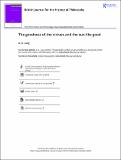Files in this item
The goodness of the virtues and the Sun-like good
Item metadata
| dc.contributor.author | Long, Alex | |
| dc.date.accessioned | 2023-03-27T15:30:04Z | |
| dc.date.available | 2023-03-27T15:30:04Z | |
| dc.date.issued | 2023-09-30 | |
| dc.identifier | 282095346 | |
| dc.identifier | 05d7878d-74e8-4bf0-bd71-226547494189 | |
| dc.identifier | 85147675842 | |
| dc.identifier | 000926315700001 | |
| dc.identifier.citation | Long , A 2023 , ' The goodness of the virtues and the Sun-like good ' , British Journal for the History of Philosophy , vol. 31 , no. 6 , pp. 1260-1268 . https://doi.org/10.1080/09608788.2023.2168252 | en |
| dc.identifier.issn | 0960-8788 | |
| dc.identifier.uri | https://hdl.handle.net/10023/27271 | |
| dc.description.abstract | Does the Longer Way, described but not taken in Plato's Republic, provide understanding that justice and other virtues are good? Sarah Broadie argues that it does not, on the grounds that Socrates and the brothers learn about justice's goodness without taking the Longer Way. I argue that Socrates’ arguments for justice's goodness are not so complete as to make it impossible for philosopher-rulers to gain from the Longer Way greater understanding of the same point. My main textual evidence is a passage of Book IX (589b–c), a summary that has been widely underappreciated. | |
| dc.format.extent | 9 | |
| dc.format.extent | 1057158 | |
| dc.language.iso | eng | |
| dc.relation.ispartof | British Journal for the History of Philosophy | en |
| dc.subject | Sarah Broadie | en |
| dc.subject | Plato | en |
| dc.subject | Republic | en |
| dc.subject | Goodness | en |
| dc.subject | Justice | en |
| dc.subject | T-NDAS | en |
| dc.subject | MCC | en |
| dc.title | The goodness of the virtues and the Sun-like good | en |
| dc.type | Journal item | en |
| dc.contributor.institution | University of St Andrews. School of Classics | en |
| dc.identifier.doi | 10.1080/09608788.2023.2168252 | |
| dc.description.status | Peer reviewed | en |
This item appears in the following Collection(s)
Items in the St Andrews Research Repository are protected by copyright, with all rights reserved, unless otherwise indicated.

